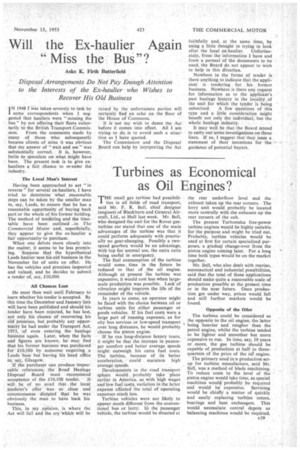Will the Ex-haulier Again "Miss the Bus"?
Page 145

If you've noticed an error in this article please click here to report it so we can fix it.
Asks K. Firth Butterfield
Disposal Arrangements Do Not Pay Enough Attention to the Interests of the Ex-haulier who Wishes to Recover His Old Business
IN 1948 1.--w-as taken severely. to task by 1 some correspondents when I sug-gested that hauliers were " missing the bus" by not offering their fleets voluntarily to the British Transport Commission. From the comments made by many of those who subsequently became clients of mine it was obvious that my answer of "wait and see" was substantially correct. It is, however, futile to speculate on what Might have been. The present task is to give exhauliers a fair chance to re-enter the industry.
The Local Man's Interest Having been approached to act "in reverse" for several ex-hauliers, I have tried to determine what reasonable steps can be taken by the smaller man in, say, Leeds, to ensure that he has a reasonable opportunity of buying back part or the whole of his former holding. The method of tendering and the timetable have been outlined sin The Commercial Motor and, superficially, they appear to give the ex-haulier a fair opportunity to purchase.
When one delves more closely into the matter, it seems to be less promising. Suppose that the hypothetical Leeds haulier sees his old business in the November list of units on offer, He has the vehicles and premises inspected and valued, and he decides to submit a tender of, say, £10,000.
All Chances Lost He must then wait until February to learn whether his tender is accepted. By this time the December and January lists will have been published and should his tender have been rejected, he has lost, not only his chance of recovering his old Premises, but probably any opportunity he had under the Transport Act, 1953, of even entering the haulage business again. Later, when the facts and figures are known, he may find that his former business was purchased for £10,100 by someone requiring a Leeds base but having his head office in, say, Glasgow.
• If the purchaser can produce-impeccable references, the Road Haulage Disposal Board must recommend
acceptance of the £10,100 tender, It will be of . no avail that . the local tenderer's offer was so dose and commonsense -dictated that he was obviously the man to have back his business.
This, in my opinion, is where the Act will fail and the cry 'which will be raised by the unfortunate parties will certainly find an echo on the floor of the House of Commons.
It is not my wish to damn the Act before it comes into effect. All I am trying to do is to avoid such a situation as I have quoted.
The Commission and the Disposal Board can help by intetpreting the Act faithfully and, at the same time, by using a little thought in trying to look
after the local ex-haulier. Unfortunately, from the information I have and from a perusal of the documents to be used, the 13oard do not appear to wish to help in this direction.
Nowhere in the forms of tender is there anything to indicate that the applicant is tendering for his former business. Nowhere is there any request for information as to the applicant's past haulage history in the localitY,of the unit for which the tender is being submitted. A few questions of this type and a little consideration might benefit not only the individual, but the whole haulage industry.
It may well be that the Board intend to carry out some investigations on these lines. If so, I suggest that they issue a statement of their intentions for the guidance of potential buyers.












































































































































































































































